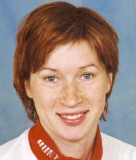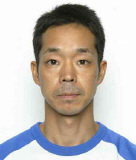Alpine Skiing: The
men's slalom ran today, and it was brutal: a total of
41 DNFs, as well as four
DNSes and five disqualifications. In other words, more athletes were unable to complete the race (50) than put in a result (47). Amidst the carnage, in 47th place was Japanese skier
Yasuhiro Ikuta, 26, whose time of 2:23.28 was more than 40 seconds off the pace. But at least he finished -- although I get the impression that alpine skiing is one of those events where it's not necessarily considered better to
DFL than
DNF.
Bobsled: In the
men's four-man bobsled, the Brazilians came last. Yes, while Jamaica may not have qualified a team,
Brazil did -- presumably through continental qualification (see
previous entry for bobsled qualifying rules). Anyway, the boys from Brazil are
Ricardo Raschini, 38,
Marcio Silva, 25,
Claudinei Quireno, 35, and
Edson Bindilatti, 26; their time after three runs was 2:58.94, or 5.32 seconds off the pace at that point. Teams below 20th place didn't get a fourth run. There was one
DNS.
Short Track: Three finals today, so three attempts at divining the last-place finisher in an event where time matters less than place, and there's heats.
In the men's 500-metre and women's 1,000-metre events, I'm awarding the
DFL to the person who puts in the slowest non-advancing time in the heats (on the basis that if you have an even slower time but advance, usually it's because someone else was disqualified, meaning they interfered, and because you invariably put in a better result in a later race).
So, in the
men's 500-metre heats on Wednesday, 21-year-old
Anthony Lobello of the USA had the slowest non-advancing time: 1:13.722. Most other competitors had races in the 42-44 second range, so a fall is likely here. In the
women's 1,000-metre heats, also on Wednesday, Latvian skater
Evita Krievāne had the slowest non-advancing time: 1:39.986. Her time, on the other hand, was only a few seconds off the pace.
The
men's 5,000-metre relay, on the other hand, was easy to figure out: the
German team of
Thomas Bauer, 21,
Andre Hartwig, 22,
Arian Nachbar, 29, and
Sebastian Praus, 25, finished last (er, second) in the B final.
 Speed Skating:
Speed Skating: One event left -- the
women's 5,000-metre, in which
Katarzyna Wójcicka, 25, skating for Poland, finished 16th. Her time was 7:28.09, about 29 seconds off the pace. It's worth mentioning that this is Wójcicka's
fourth event: she finished 10th in the 3,000-metre, eighth in the 1,000-metre and 11th in the 1,500-metre races. Don't for a moment think that last-place finishers are always in the back of the field; 'tain't always so.
Standings to date: With only one event still to report its last-place finisher -- the men's 50-km cross-country ski race -- we're almost there. Japan inches into second place, with as many last-place finishes as Romania but more than three times the athletes. Poland and Latvia move up the top 10, from eighth and ninth to sixth and seventh, respectively. Brazil, Germany and the USA add their second last-place finishes and move into the top 20.
Labels: alpine skiing, bobsled, brazil, germany, japan, poland, short track, speed skating, torino 2006, usa


 Speed Skating: One event left -- the
Speed Skating: One event left -- the  Biathlon: The results for this morning's biathlon events are already in, so I'll report them now before the deluge of later events. In the
Biathlon: The results for this morning's biathlon events are already in, so I'll report them now before the deluge of later events. In the 
